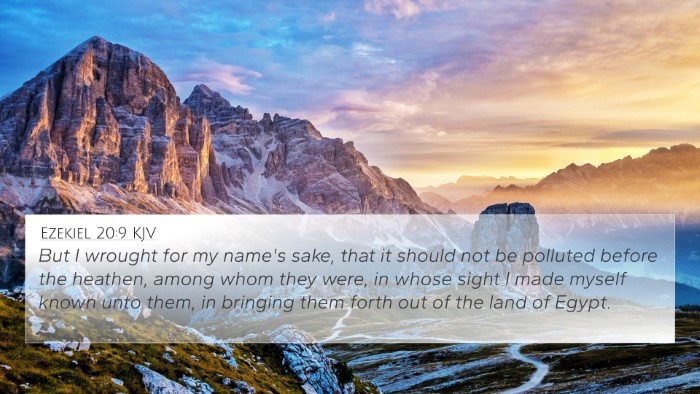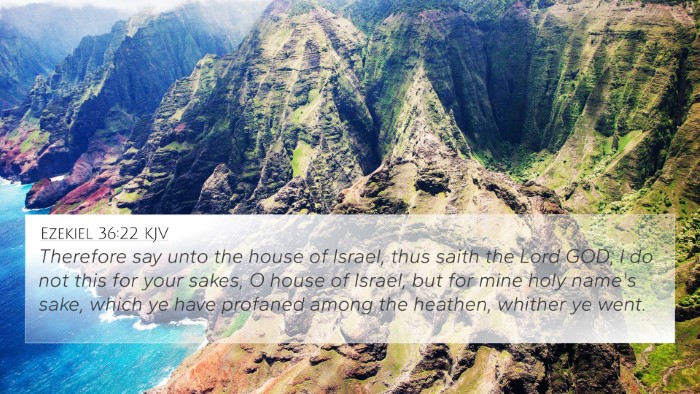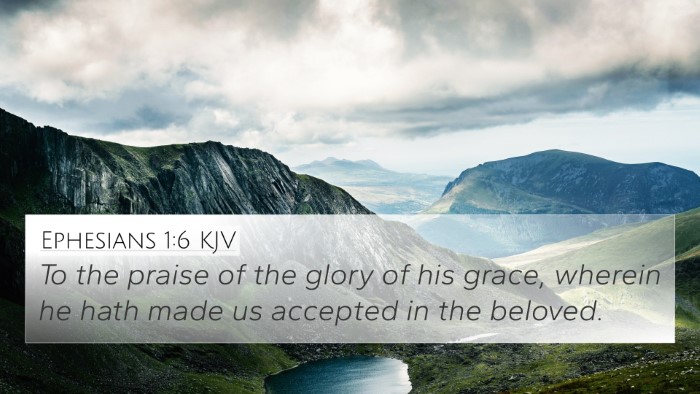Understanding Ezekiel 20:14
Ezekiel 20:14 states: "But I wrought for my name's sake, that it should not be polluted before the heathen, among whom they were." This verse highlights the profound aspect of God's commitment to His name and reputation, even amidst the unfaithfulness of Israel.
Meaning and Interpretation
The prophet Ezekiel is conveying God's intention to uphold His holiness and glory. Despite Israel's frequent disobedience and rebellion, God acts not only out of love for His people but also out of a desire to maintain the sanctity of His name among the nations.
-
Matthew Henry's Commentary: Henry emphasizes that the preservation of God's name is central to His dealings with Israel. He notes that God's actions are intended to demonstrate His faithfulness, despite the people's unfaithfulness.
-
Albert Barnes' Commentary: Barnes reflects on the significance of God's name in biblical context. He states that God desires His people to be aligned with His standards, and through His judgments, He seeks to show the nations that He is not a god to be mocked.
-
Adam Clarke's Commentary: Clarke underscores God's mercy amidst judgment. He argues that by preserving His name, God shows His nature, demonstrating patience and long-suffering even when deserving punishment is warranted.
Connection to Other Bible Verses
Ezekiel 20:14 connects deeply with several other scriptures, showcasing the comprehensive narrative of God's name and reputation throughout the Bible. Below are significant cross-references that deepen the understanding of this verse:
- Exodus 33:12-14 - Moses intercedes for Israel, emphasizing God's presence and name.
- Isaiah 48:9-11 - God speaks of His purpose in preserving His name even in judgment.
- Psalm 106:8 - Reflects on God's actions in delivering Israel for His name's sake.
- Romans 9:17 - Paul references God's hardening of Pharaoh's heart to demonstrate His power that glorifies His name.
- Ezekiel 36:22-23 - God promises to vindicate His name through Israel's restoration.
- Jeremiah 14:7 - The plea for God's mercy based on His name and glory among the nations.
- Matthew 6:9 - Jesus teaches the disciples to pray, emphasizing the hallowed nature of God’s name.
Thematic Bible Verse Connections
The concept of God's name being paramount in His relationship with humanity is a recurring theme. These verses illustrate the continuity of thought regarding God's intention to uphold His glory:
- God's name signifies His authority and power—an anchor for His people.
- Divine grace and judgment are closely tied together to demonstrate the seriousness of God's name.
- The call for holiness among God’s people relates to His reputation on earth.
Usage of Cross-references in Study
When studying Ezekiel 20:14, using tools for cross-referencing can yield deeper insights. Here are some methods for effectively utilizing cross-references in Bible study:
- Bible Concordance: Use a concordance to find related themes or phrases.
- Bible Cross-reference Guide: Guides can help locate specific verses that connect different biblical texts.
- Inter-Biblical Dialogue: Compare Old and New Testament themes for comprehensive insights.
Conclusion
Ezekiel 20:14 serves as a powerful reminder of God's commitment to His name and glory. By exploring this verse alongside associated scriptures, one can better grasp the overarching narrative of redemption and sanctification present within the biblical text.
Further Consideration
Reflecting on how individual verses are interlinked enhances our understanding of scripture as a cohesive whole. For those engaging in a detailed cross-reference study, consider exploring the various dimensions of God's nature as expressed throughout the Bible.







